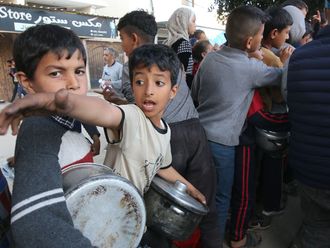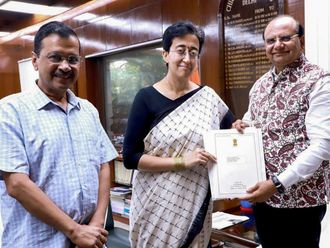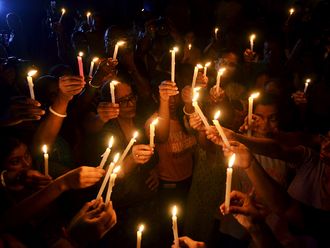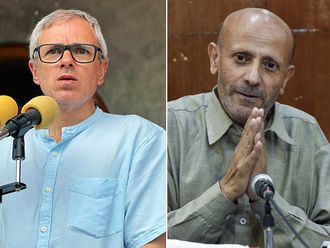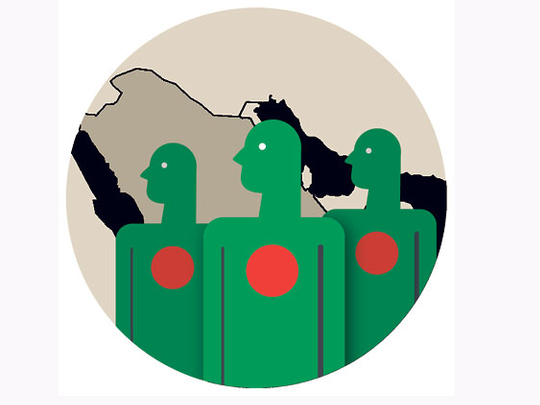
More often than not, across the countries in the Gulf, Bangladeshis garner news space often for the wrong reasons, attracting the mistrust of their host countries. Often comprising the lowest paid strata of imported help, Bangladeshis have nevertheless made their mark.
In Saudi Arabia, for example, this group of expatriates has been unjustly maligned as a purveyor of criminal activity, and this sort of generalisation is a gross injustice to the majority of the two million plus workers who left their country to earn a living here.
It is regrettable that the Saudi media has focused on the misdeeds of a few Bangladeshi nationals caught in a web of criminal activity to tarnish a whole group of hard-working expatriates who are performing vital services across the kingdom.
As a Bangladeshi reader recently lashed out, "Those behind the concerted campaign accusing Bangladeshis of a variety of criminal activities can congratulate themselves: They have succeeded in tarnishing the image of an entire people, among whom are doctors, engineers, teachers and professors, businessmen, consultants and executives as well as office assistants, cleaners, drivers, sweepers, guards, farmers, daily labourers and others — just like any other expatriate group in the kingdom."
And while it is common to perceive this group of guest workers as menial labour, one must be reminded of the fallacy of this perception. Indeed, Bangladesh is one of the poorer countries with a population of about 140 million and as is the case with any underdeveloped country, its people have to seek opportunities outside their boundaries. But that does not in any way diminish the character and honour of these guest workers.
Host of achievements
And among themselves, the Bangladeshis can stand up and be proud of the universal achievements of some of their countrymen.
Who has not heard of Mohammad Younus, the Bangladeshi economist who won the Nobel Prize in 2006 for pioneering micro-credit lending schemes for the poor, especially women, in his country? His micro-credit ideas are now in practice in more than 60 countries, including the US.
Or Irene Khan, a Bangladeshi lawyer who graduated from Harvard and who in 2001 became the first woman to head Amnesty International's human rights movement, a post she held for more than eight years. Incidentally, she was the first Asian to achieve such status.
Bibi Russel is another, who started her life of fame as a model for a number of leading fashion houses like Emporio, Giorgio Armani, Yves Saint Laurent, Karl Lagerfeld and Kenzo.
Personalities
In 1994 she began work as a Bangladeshi designer, putting Bangladeshi fashion on the map. Bibi employs some 35,000 weavers in her home country, and her company has expanded its services to include a number of products for the home — all of them hand-made in Bangladesh and popular all over the world.
Fazlul Rahman Khan of Bangladesh, a structural engineer who designed Chicago's 100-storey John Hancock Centre and 110-storey Sears Tower, the tallest building in the US since its completion in 1974. In 1998, the city of Chicago named the intersection of Jackson and Franklin Streets (located at the foot of the Sears Tower) "Fazlur R. Khan Way" in honour of the designer of the tower.
Dr Abdul Wabid, a devoted Bengali writer, the author of over 300 books and journals, and also an educationist, translator, columnist and researcher has been continuously enriching Bengali literature by his writings and research. They are among many Bangladeshis who through their skills and hard work have contributed domestically and universally.
It is a grave offence to lump our Bangladeshi guest workers into one basket and discriminate against them on the basis of criminal activities by a few. Perhaps it should be more than social interest to analyse why some of these lowly-paid workers, and not necessarily just Bangladeshis, resort to criminal activity. Can it be that they are denied all their rights and exploited to the point they become desperate?
No group of workers in this country, including Saudi nationals, is bereft of criminal behaviour. However, a few bad apples whose deeds gather front page attention do not represent the entire body.
Saudi Arabia's failure to recognise that would be of great disservice to the many honest and hard-working individuals who hail from Bangladesh.
Tariq A. Al Maeena is a Saudi socio-political commentator. He lives in Jeddah, Saudi Arabia.


